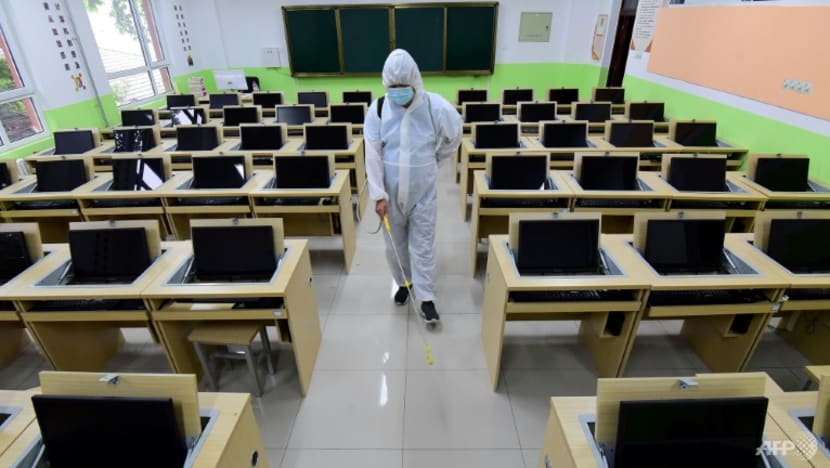China’s shift in COVID-19 stance more targeted at current strains, but elderly vaccination remains tricky: Analyst
Prior to Omicron, China could contain COVID-19 outbreaks by targeting communities but today, with the increased transmissibility of the strain, the protocols need to be refined, an expert said.

China is the only major global economy sticking to a zero-COVID policy. (Photo: AFP/STR)
SINGAPORE: China’s softening of its stance on the severity of COVID-19 and the easing of some restrictions show that the country is moving away from its “one size fits all” approach that has been enforced since the start of the pandemic, an expert said.
Its COVID-19 measures, which have worked for previous strains like Delta, are today outdated when dealing with the current dominant strain, with Omicron being far more transmissible but less severe, said Pathology Clinical Professor John Nicholls.
However, its shift in stance also came with a push to boost vaccination rate in its elderlies – an initiative that will be tricky to pull off, Prof Nicholls told CNA’s Asia Now on Thursday (Dec 1).
“The measures that they have taken in the past, which is mass testing and isolation, basically one positive case they would isolate the whole building to control the outbreak, they are not working,” Prof Nicholls said.
“The reason is that this one-size-fits-all policy of managing, which they used for Delta … they have to try and fine-tune it … make it a little bit more targeted towards the fact that this Omicron strain is different from Delta and other strains, and they should be adapting their response,” he said.
EASING DESPITE RECORD CASES
China’s shifting of its stance came even as daily infections hovered near record highs. However, Prof Nicholls said that China is not unique in this, pointing to other countries that saw a surge in cases when the Omicron strain appeared.
“Cases are at record highs because Omicron is more transmissible. Also, we're moving into winter season and with the cold weather, people tend to congregate more,” he said.
Prior to Omicron, China could contain outbreaks by targeting communities but today, with the increased transmissibility of the strain, the protocols need to be refined, Prof Nicholls said.
People are also gradually starting to realise that the Omicron strain is not as severe, and does not warrant the curbs – some of the strictest in the world – that Chinese officials have put in place, he said.
Since the start of the pandemic, large swathes of the country have been put into periods of harsh lockdowns and quarantine orders under the country’s strict COVID-zero policy, at times over just a handful of cases.
Related:
Anger spilled onto the streets earlier this week as soaring caseloads in recent months saw authorities intensify measures to control the outbreak.
Protesters took to the streets and universities across China in unprecedented demonstrations.
“The realisation is that the public can only get used to so many restrictions before there’s some pushback. So there should be a little bit more softening, and although not equivalent to opening up, basically easing of restrictions, easing of the testing…” Prof Nicholls said.
ELDERLIES RELUCTANT TO GET VACCINATED
A day before announcing its new stance, China called for a stronger push to vaccinate its older population, but stopped short of introducing a mandate.
Official figures showed that 68.7 per cent of those aged 60 and above have taken three shots, but the rate fell to 40.4 per cent for those 80 and above, according to Hong Kong-based newspaper The South China Morning Post.
Prof Nicholls said that Chinese Vice Premier Sun Chunlan, who oversees COVID-19 efforts, has been handed a “poisoned chalice” to try and improve vaccination rates in the elderly.
“I do have sympathy for her, if she’s been mandated to increase the vaccination rate in the elderly. How is that actually going to happen?” he asked.
Prof Nicholls cited his own experience in Hong Kong, where the city’s government “tried all sorts of sticks and carrots” to coax the elderly into receiving vaccinations, but to no avail.
“With Omicron in March, we thought that the elderly would be flocking to get vaccinated but it didn’t happen. They’ll say it's not safe, we don't need it. So I think that big sticking point of vaccination in the elderly is going to be a difficult one,” he said.
Without a vaccine mandate, there will be a sizable proportion of the elderly who will be adamant to continue being vaccine-free, Mr Nicholls said.
However, vaccine mandates will be difficult to introduce. Previous attempts by city governments to mandate vaccine passes on public transports and public spaces were scrapped after being met with backlash.
When asked if the easing of restrictions meant that China might open up soon, Prof Nicholls said: “It’s a big country with so many factors involved - health, economic, political factors … We cannot second guess what’s going to happen with China.”














